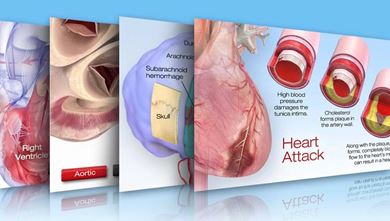High Blood Pressure and Women
Pregnancy and other factors can elevate the risk of HBP among women
One common misconception is that high blood pressure (HBP or hypertension) rarely affects women. However, nearly half of all adults with high blood pressure are women. And at 65 and older, women are more likely than men to get high blood pressure. While high blood pressure isn't directly related to gender, throughout a woman’s life, health issues like pregnancy, pregnancy prevention (birth control) and menopause can increase the risk of developing high blood pressure.
Blood pressure during childbearing years
Birth control pills
Medical researchers have found that birth control pills increase blood pressure in some women. It’s more likely to occur if you’re overweight, have had high blood pressure during a previous pregnancy, have a family history of high blood pressure or mild kidney disease. The combination of birth control pills and cigarette use may be especially dangerous for some women. Learn more about quitting smoking.
Before taking oral contraceptives:
- Talk to your doctor about the risks.
- Make sure your doctor measures and records your blood pressure before prescribing oral contraceptives.
- Have your blood pressure checked approximately every six months.
Getting pregnant if you already have high blood pressure
By following the recommendations of your doctor and carefully managing your blood pressure, you can help ensure a normal pregnancy and a healthy baby. However, high blood pressure can be dangerous for both mother and baby. If you are taking medication and want to become pregnant, first consult your doctor. Also keep in mind that if you already have high blood pressure, pregnancy could make it more severe.
Before becoming pregnant:
Each woman is different, and your doctor will give you recommendations for your situation. Most women with high blood pressure should follow these precautions before becoming pregnant. (However, if you have any questions or concerns, check with your doctor first.):
- Get your blood pressure under control.
- Watch your diet and limit sodium.
- Be active and exercise. Regular physical activity will help you control your blood pressure and improve your physical condition.
- If you’re overweight, lose weight to help you have a safer pregnancy and a healthier baby.
- If you smoke, quit. If you drink alcohol, stop.
- If you’re on medication for high blood pressure (or any other condition), discuss all of your medications, including over-the-counter drugs and supplements, with all of your doctors. Never stop taking a prescription medication without first consulting the doctor who prescribed it.
Managing your blood pressure while you’re pregnant can prevent:
- Harm to your kidneys and other organs.
- Low birth weight and early delivery of the baby.
ACE inhibitors or ARBs and pregnancy
Women who are taking ACE inhibitors or ARBs for high blood pressure should not become pregnant while on this class of drugs. If you’re taking an ACE inhibitor or an ARB and think you might be pregnant, see your doctor immediately for assessment and advice.
Gestational hypertension
Some women who have never had high blood pressure develop it while they are pregnant. When this happens after 20 weeks of pregnancy, it is known as gestational hypertension, a form of secondary hypertension caused by the pregnancy that usually disappears after delivery. If the mother is not treated, high blood pressure can be dangerous to both the mother and baby. That’s why doctors usually keep a close watch on a woman’s blood pressure during pregnancy.
Preeclampsia
Preeclampsia (sometimes known as toxemia of pregnancy) is a condition, closely related to gestational hypertension, that typically begins after the 20th week of pregnancy. It’s usually characterized by high blood pressure and elevated protein in the urine. Delivery of the baby is the only cure for preeclampsia.
The following factors raise your risk of preeclampsia:
- Primiparity (first pregnancy)
- Previous preeclamptic pregnancy
- Chronic hypertension, chronic renal disease or both
- Thrombophilia, a tendency to form blood clots
- Multifetal pregnancy (with triplets posing a greater risk than twins)
- In vitro fertilization
- Family history of preeclampsia
- Type I diabetes mellitus or type II diabetes mellitus
- Obesity
- Systemic lupus erythematosus
- Advanced maternal age (40 years and up)
Preeclampsia can endanger the lives of both mother and child by:
- Harming the placenta.
- Damaging the mother’s kidneys, liver and brain.
- Causing fetal complications such as low birth weight, premature birth and stillbirth.
Not all women have noticeable symptoms of preeclampsia. When symptoms do occur, they can include:
- Headaches
- Changes in vision
- Abdominal pain
- Rapid swelling (edema)
Preventing gestational hypertension or preeclampsia
There is no proven way to prevent gestational hypertension or preeclampsia and no test that will predict or diagnose these conditions. Only regular visits to your doctor will confirm that you’re having a safe pregnancy. Your doctor will track your blood pressure and check the level of protein in your urine. For a healthy pregnancy, you should:
- Get early and regular care from your doctor. (Don’t miss appointments.)
- If advised by your doctor, monitor your blood pressure at home.
- Do what you can to help manage your blood pressure, including limiting sodium intake and getting regular physical activity.
High blood pressure after menopause
While you may have had normal blood pressure most of your life, your chances of developing high blood pressure increase considerably after menopause. See your doctor regularly to have your blood pressure monitored.
Learn more






